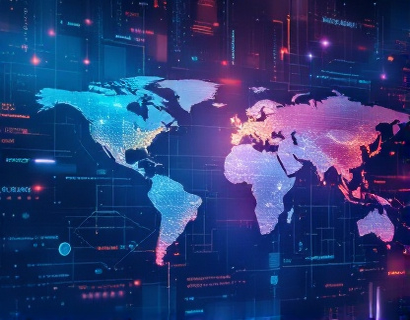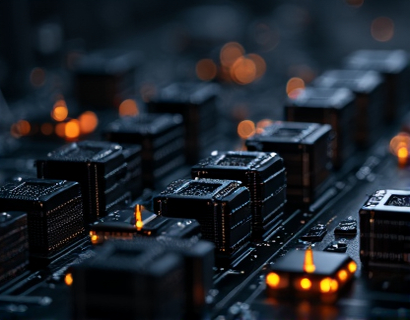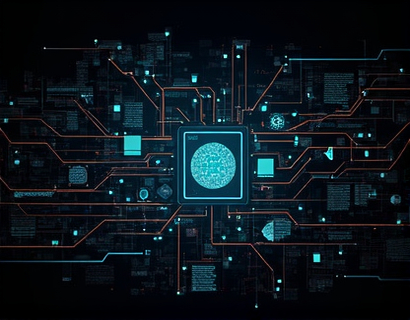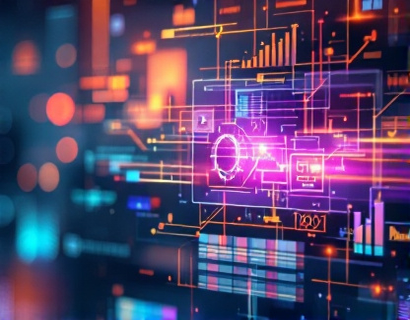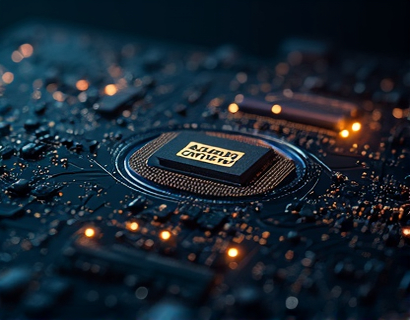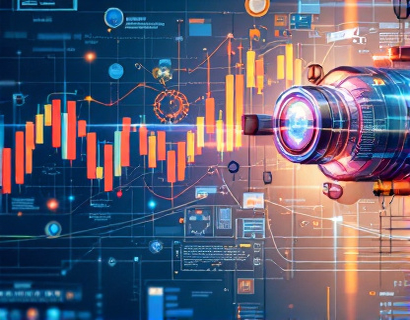Crypto and AI Synergy: Transforming Digital Experiences with Next-Gen Tech Solutions
The intersection of cryptocurrency and artificial intelligence (AI) is giving rise to a new era of digital innovation, where the synergy between these two cutting-edge technologies is redefining the landscape of digital experiences. This article delves into how the combination of blockchain and AI is creating advanced applications that not only enhance user experiences but also connect innovators with the tools they need to push the boundaries of technology. For tech-savvy individuals interested in cryptocurrency, AI enthusiasts, digital marketers, and early adopters of technology, understanding this synergy is crucial for staying ahead in the rapidly evolving digital world.
The integration of AI into the crypto space is not just about improving existing systems; it's about creating entirely new paradigms. AI's ability to process vast amounts of data, learn from patterns, and make predictions is invaluable in the realm of cryptocurrency, where market dynamics are complex and ever-changing. By leveraging AI, crypto platforms can offer more secure, efficient, and user-friendly services. This article explores the transformative power of this merger, highlighting key areas where crypto and AI are converging to revolutionize digital strategies and user experiences.
Enhanced Security Through AI-Driven Crypto Solutions
One of the most significant benefits of combining AI with cryptocurrency is the enhancement of security measures. Traditional crypto exchanges and wallets are often targets for cyberattacks due to their high value and the sensitive nature of the data they handle. AI can significantly mitigate these risks by implementing advanced threat detection systems. Machine learning algorithms can analyze patterns in transaction data to identify and flag suspicious activities in real-time, providing a proactive defense against potential breaches.
Moreover, AI can improve the security of private keys and wallet management. By using behavioral analytics, AI systems can detect anomalies in user behavior, such as unusual login times or locations, and trigger additional verification steps to prevent unauthorized access. This not only protects users' assets but also builds trust in crypto platforms, encouraging more people to adopt these technologies.
Optimized Trading and Investment Strategies with AI
The crypto market's volatility presents both opportunities and challenges for investors. AI-driven trading platforms are changing the game by providing sophisticated tools that can analyze vast amounts of market data to make informed trading decisions. These platforms use natural language processing (NLP) to analyze news articles, social media posts, and other textual data to gauge market sentiment and predict price movements.
Additionally, AI algorithms can execute trades at optimal times, taking into account various factors such as market trends, historical data, and real-time news updates. This level of automation and precision is unattainable through manual trading, allowing investors to maximize their returns while minimizing risks. For digital marketers and businesses looking to invest in crypto, AI-driven insights can provide a competitive edge in navigating the complex crypto landscape.
Personalized User Experiences Through AI
The user experience (UX) is a critical factor in the adoption and success of any digital platform. AI can significantly enhance UX in the crypto space by offering personalized services tailored to individual user preferences and behaviors. For instance, AI-powered recommendation systems can suggest crypto assets, trading strategies, and educational content based on a user's past interactions and interests.
Chatbots and virtual assistants driven by AI can provide 24/7 customer support, answering queries and guiding users through complex processes with ease. This level of personalization not only improves user satisfaction but also increases engagement and loyalty. For businesses looking to create a seamless and engaging digital experience, integrating AI into their crypto offerings is essential.
Decentralized Applications (DApps) and AI
Decentralized applications (DApps) are a cornerstone of the crypto revolution, offering decentralized alternatives to traditional centralized applications. The integration of AI into DApps opens up new possibilities for functionality and user interaction. AI can enhance the smart contracts that power DApps by adding adaptive and responsive features. For example, AI can dynamically adjust the parameters of a smart contract based on real-time data, ensuring optimal performance and fairness.
Moreover, AI can improve the user interface (UI) of DApps, making them more intuitive and user-friendly. By analyzing user interactions, AI can suggest design improvements and optimize the layout for better usability. This synergy between DApps and AI not only enhances the user experience but also fosters innovation, leading to the development of more sophisticated and useful decentralized applications.
Supply Chain Transparency and Efficiency with Blockchain and AI
Beyond the crypto space, the combination of blockchain and AI is transforming supply chain management. Blockchain provides a transparent and immutable ledger for tracking goods from production to delivery, while AI can analyze this data to optimize logistics and reduce costs. By integrating these technologies, businesses can achieve greater transparency, traceability, and efficiency in their supply chains.
AI can predict demand, optimize inventory levels, and identify bottlenecks in the supply chain, all while ensuring that the data is secure and tamper-proof due to the blockchain's inherent properties. This synergy not only enhances operational efficiency but also builds trust among stakeholders, from manufacturers to consumers. For businesses seeking to modernize their supply chain operations, this integration is a game-changer.
Challenges and Considerations
While the potential benefits of merging crypto and AI are substantial, there are also challenges and considerations that must be addressed. One of the primary concerns is the regulatory landscape. As both crypto and AI are relatively new and rapidly evolving fields, regulations are still catching up. Businesses and developers must stay informed about regulatory changes and ensure compliance to avoid legal issues.
Another challenge is the technical complexity involved in integrating these technologies. Developing AI-driven crypto solutions requires a deep understanding of both domains, which can be a barrier for some organizations. Collaboration between experts in crypto, AI, and software development is essential to overcome these technical hurdles.
Additionally, there is the issue of scalability. As the adoption of crypto and AI grows, the systems must be able to handle increasing amounts of data and transactions without compromising performance. Investing in robust infrastructure and continuous optimization is crucial to ensure scalability.
Future Prospects and Innovations
The future of crypto and AI synergy is bright, with numerous innovations on the horizon. One area of excitement is the development of AI-powered decentralized finance (DeFi) platforms. These platforms can offer more sophisticated financial products, such as AI-driven lending and borrowing services, automated market makers, and risk management tools, all within a decentralized framework.
Another promising area is the integration of AI with non-fungible tokens (NFTs) and digital art. AI-generated art and unique digital assets can be securely tokenized on the blockchain, creating new markets and opportunities for creators and collectors. AI can also enhance the authenticity and provenance verification of digital art, addressing concerns in the NFT space.
Furthermore, the combination of crypto, AI, and the Internet of Things (IoT) is paving the way for smart contracts that can interact with physical devices and environments. This could lead to the development of autonomous systems that can execute transactions and manage resources based on real-time data, further blurring the lines between the digital and physical worlds.
In conclusion, the synergy between cryptocurrency and AI is transforming digital experiences by enhancing security, optimizing trading, personalizing user interactions, and revolutionizing supply chain management. As these technologies continue to evolve, businesses and innovators must embrace this synergy to stay competitive and drive innovation. For those interested in exploring the future of technology, understanding the intersection of crypto and AI is essential for harnessing the full potential of next-generation tech solutions.



